Again, No.
A video posted to Rumble by Gail Golec on January 10, 2022, highlighted a section of the Pima County 2020 Election Integrity Hearing which promoted the claim that the Voting System Testing Laboratories (VSTLs) used to certify the election equipment in the County were not NVLAP certified and therefore the voting machines approved by the VSTL were invalid for use. The claims in the video attempt to apply the claim to all of Arizona, not just Pima County, even though this particular hearing was specific to Pima County, AZ.
On January 12, 2022, at 6:40 AM, Patrick Byrne posted the video to his Telegram channel, sharing it from the Ron Watkins Telegram channel. Watkins posted the video at 1:37 AM, January 10, 2022. It is important to note that Watkins is currently attempting to run for Congress in the State of Arizona.
Four hours and twenty-four minutes into the hearing, (the video posted only covers the portion discussed in this post. To see the hearing in its entirety, click HERE.) following a break, Reyana Elden, who offers no explanation of her own qualifications or expertise other than, “We’ve been studying this one small part of election integrity for, uh, since February,” begins a presentation on VSTL certifications.

The first certificate Elden uses in her presentation is the Pro V&V Election Assistance Commission (EAC) certificate covered in our previous post on this issue. Elden’s concern centers around the apparent expiration of said certificate of accreditation. Much is said about the 2017 expiration date on the displayed certificate.

Elden then moves on to SLI Compliance, the only other EAC accredited VSTL in the U.S. SLI’s certificate is also called into question, primarily because its most recent certificate covered a three year period, which Elden describes as a, “three year delta,” instead of the standard two-year certification period.

Elden refers to the date issues and the late issuance of the certificates as the EAC attempting to, “cover their tracks.” Below is a closer look at the certificate in question.

As explained previously, the EAC issued a memo on behalf of Pro V&V and SLI explaining that the EAC erred in not issuing updated certificates to the two companies. The EAC also explained that neither testing laboratory was out of compliance, nor were their accreditations ever in jeopardy. During the time period when the EAC failed to issue new certificates, both laboratories were still certified annually by the NVLAP, which is the criteria used by EAC to determine the eligibility of VSTLs. Bear in mind, according to the law, VSTL accreditation has to be voluntarily surrendered or revoked by a vote of the EA Commission. No such vote occurred and neither laboratory voluntarily withdrew from the program.
Elden then seems to make a very big deal out of just who should sign the certificates. Elden references the manual used by the EAC VSTL program, which I have embedded below.
Page 26 of the program manual does indeed state that the certificates will be signed by the Chair.
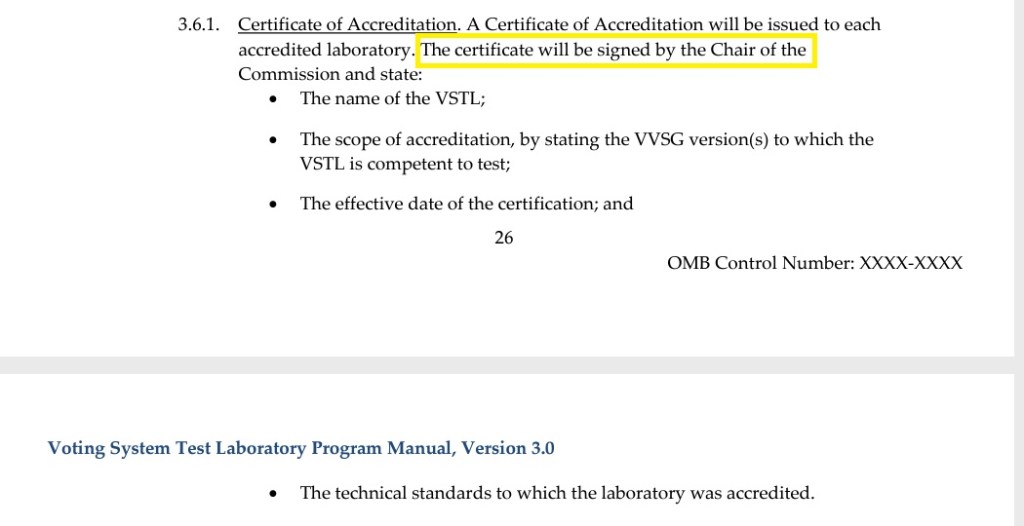
Elden contends that the persons who signed the current certificates is not normal according to historical data. We reviewed previous EAC certificates for both Pro V&V and SLI compliance using the EAC website. We found none of the previous certificates available were signed by the Chair of the commission for the year of issuance. It is simply a part of their manual, not a law.
The Chair is occupied by a different person each year, with some coming back to Chair again in later years. There has been quite a bit of turnover on the four-person commission over the years. The current Chairman of the commission is Donald Palmer, who was nominated for the position of Commissioner by President Trump and was unanimously confirmed by the U.S. Senate on January 2, 2019. He took the roll of Chairman for 2022.
Near the end of Elden’s presentation, someone on the panel attempts to clarify that Pima County, AZ, does not use the Dominion voting systems used by Maricopa County. They correctly state that Pima County uses ES&S systems. More specifically, Pima County’s approved system is the ES&S EVS 6.0.4.0. The information is taken directly from the approved equipment list found on the Arizona Secretary of State website.
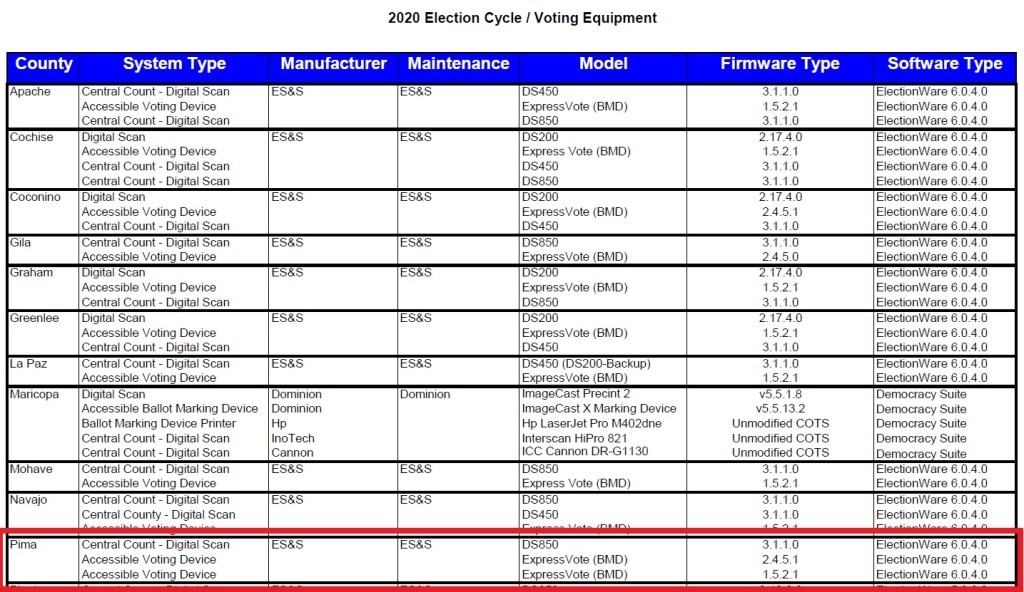
The question for Pima County is whether the ES&S system was properly certified by an accredited VSTL and whether that VSTL was fully certified and accredited by the VNLAP and the EAC. Additionally, does the three-year vs two-year certificate date actually matter?
ES&S’s approved system for Pima County was certified on May 3, 2019. The VSTL that tested the system for compliance was SLI Compliance of Wheat Ridge, Colorado. The EAC Certificate of Compliance is below.


If we bend to Elden’s expectations with regard to the effective dates and length of certification, ES&S is still in the clear. SLI Compliance was issued their new Certificate of Accreditation on January 10, 2018. Therefore, on May 3, 2019, the Accreditation was a mere 16 months old, not yet reaching the two-year limit Elden discusses at her presentation. So, the VSTL, accredited and certified by the NVLAP and the EAC, was fully in compliance and up to date when it tested the ES&S system. That system was then approved by the EAC. All of these things occurred well-within the limits of a two-year certificate.
Voting equipment, once certified and approved, aren’t subject to recertification on any sort of schedule. As long as the system remains the same, as in the firmware and software are not updated, upgraded, or modified, the system remains usable until otherwise determined by the user. When ES&S or Dominion or any other voting equipment manufacturer makes changes to those systems, updates them or gives them upgrades, those upgrades have to be tested and certified. An example is Dominion’s Democracy Suite 5.0, which was upgraded to 5.5 and the 5.5 version had various modifications applied which became 5.5B, 5.5C, and so on. Each of those versions has its own testing certification.
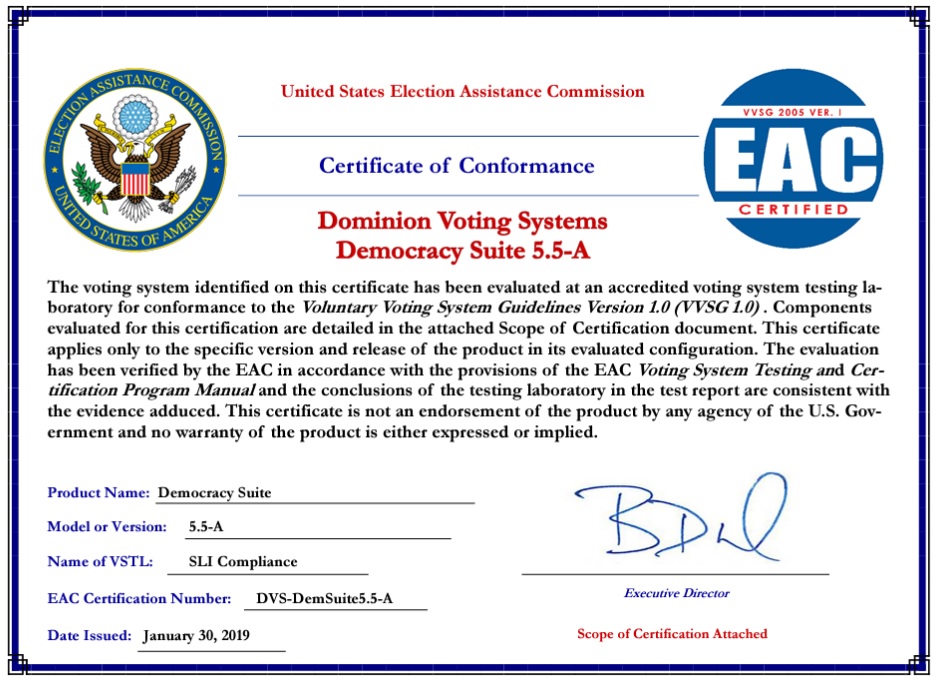
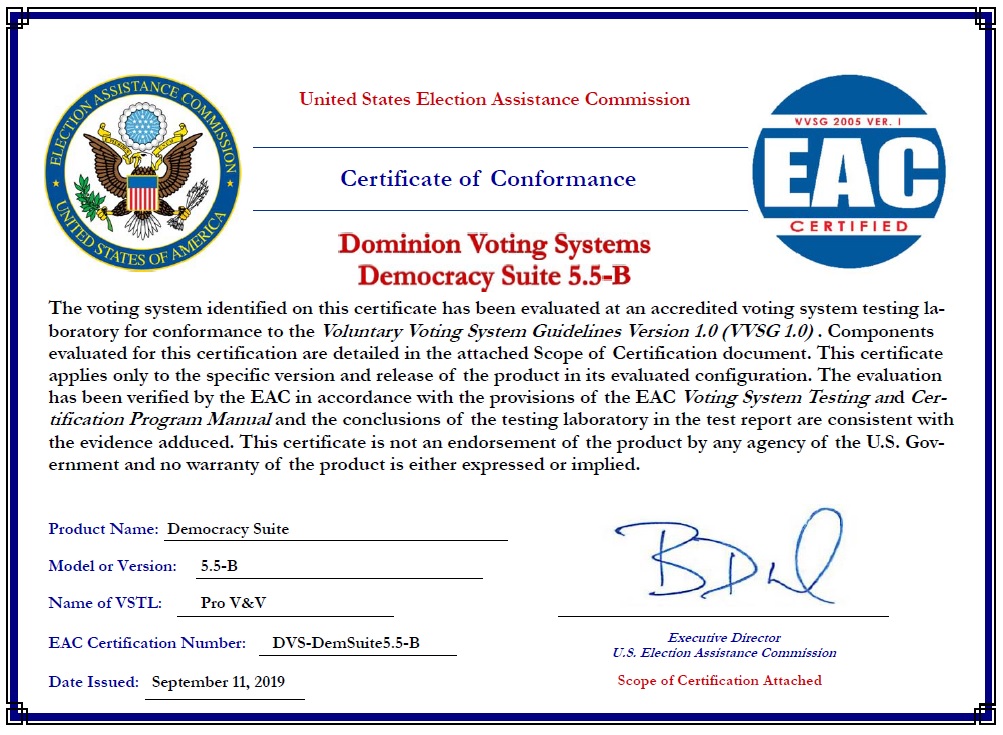
ES&S’s EVS 6.0.4.0 is itself a modification/variation of EVS 6.0.0.0. Again, each of those variant or revisions and or modifications requires its own certification.
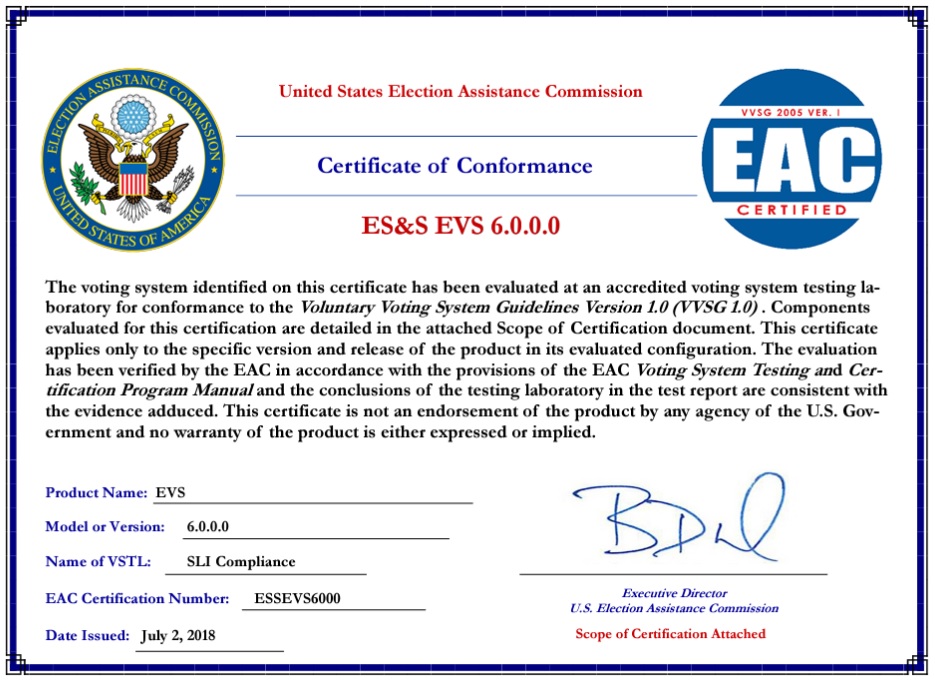


The level of research that went into Elden’s presentation was so superficial that a few simple Google searches could defeat her entire argument. We went a bit further here but the issue is that someone with no election integrity research experience was allowed to present erroneous “evidence” to politicians, voters, and the media. Her presentation wasn’t questioned or refuted by anyone during the hearing because it was painfully obvious that no one in attendance had any further knowledge of how things are done than she did. In fact, she may have been the most educated on the issue among those in attendance. This is unfortunate.
Pima County’s election equipment WAS certified and WAS tested by an accredited laboratory prior to certification by the EAC and approval by the AZ Secretary of State. What issues Pima County may have, those presented by Reyana Elden aren’t legitimate. She was incorrect from the start.
WE ADDED RELEVENT IMAGES BELOW EACH EMBEDDED DOCUMENT FOR CONVENIENCE BECAUSE NOT ALL BROWSERS AUTOMATICALLY LOAD THE EMBEDDED DOCUMENTS.
